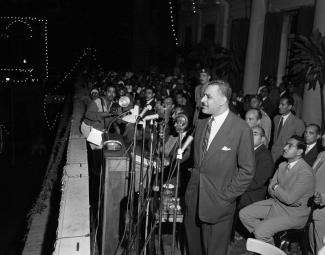Egypt
An ancient land

One might think that nationhood is something natural in Egypt. Nonetheless, different ideas of the nation have served different political purposes. A turning point in Egypt’s modern history was the anti-colonial Free Officers’ Movement of 1952. It overthrew the monarchy, which had been allied to Britain, in a military coup. Its informal leader was Gamal Abdel Nasser, who became president in 1956.
His proclaimed goal was to build a strong, socialist nation. He celebrated the armed forces as the drivers of modernisation. Dissent was dismissed as serving imperialist powers, and that applied to the Muslim Brothers too. Nasser clamped down on them after one of their members tried to kill him. The irony was that the Muslim Brothers themselves were a result of anti-colonial sentiment. Angry about foreign rule, its founders had turned to the faith. The Brotherhood’s ideology could not be reconciled with Nasser’s.
The regime implemented some redistributive policies such as land reforms. Its idea of nationhood was pan-Arabian however, as Nasser aspired to lead the entire world region. His stance towards Israel was belligerent.
When Nasser died in 1970, Vice President Anwar el-Sadat succeeded him. Sadat, too, relied on the military, but soon purged his government of Nasserists. Some political prisoners, including Islamists, were set free. Sadat’s approach to nationhood was different. His catchphrase was “Egypt comes first”. He cultivated an image of being a devout Muslim, made peace with Israel and made Egypt an ally of the USA.
Islamist groups were upset about the peace agreement with Israel, and Sadat was killed by a Muslim radical in October 1980. Sadat’s successor was Hosni Mubarak, whose rule ended in the Arab Spring of 2011. Mubarak basically carried on Sadat’s policies, but did not emphasise his faith in the same way (see main article).













